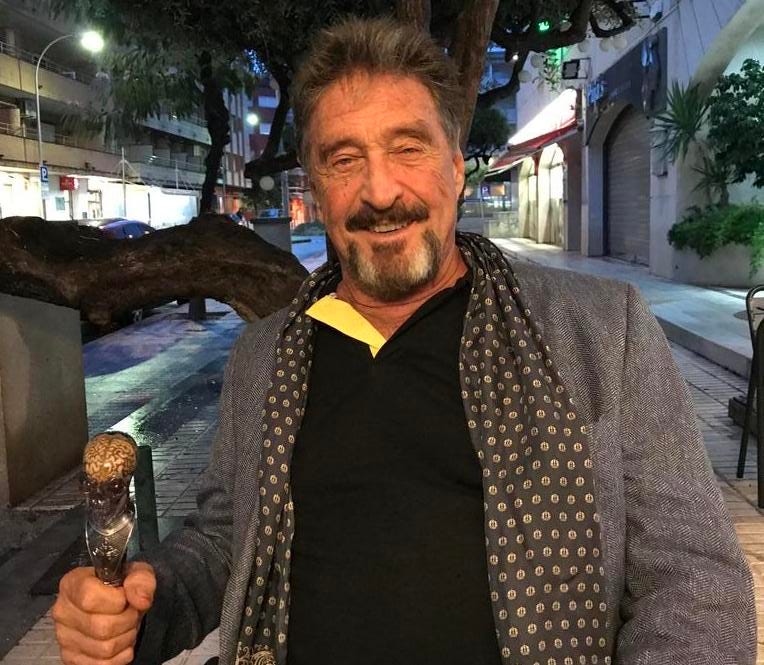Prison Suicide is Extremely Common
Speculation around deaths of imprisoned billionaires overlooks a horrific crisis of mental health.
Enigmatic billionaire and tax evader John McAfee killed himself in a Spanish prison today shortly after his extradition to the United States was approved, and, of course, the internet is treating it as Epstein Redux, fueled in part by McAfee’s own trolling about how he would never attempt suicide. This leads us to ignore the mental health crisis plaguing incarcerated people, even before problems like COVID worsened conditions.
The research is depressing. “Suicide is the third leading cause of death in U.S. prisons and the second in jails... The jail suicide rate is nine times that of the general population.” No one deserves this sort of struggle, no matter how terrible a person they may be. Many of those in jails are simply awaiting court hearings, not actually convicted of crimes.
When a 75-year-old realizes that he has little hope of ever seeing freedom again, perhaps having held out hope for lenient treatment in Spain, it is entirely unsurprising he would turn to suicide. For a man obsessed with conspiracy theory, posts from before his death simply were a way he could ensure an enigmatic legacy. The man lived in the myth of his own persona when alive — now that continues on in the minds of the public.
The epidemic of prison suicides represents an intersection of two of society’s worst failings: apathy about mental illness and apathy about prisoners. Both are connected with our reliance on incarceration, separation, and otherization to deal with our society’s problems — after all, bad mental health is the one thing that can easily land a law-abiding citizen into incarceration, though at a mental hospital rather than a prison.
Of course, there will always be people who are a danger to society and must be kept separated from it, but as long as our default framework for thinking about both mental health and crime is one of isolating the problem away from us rather than addressing the underlying issues, countless people will needlessly suffer and we all will be worse off for it.
A culture that treats suicide as rare and absurd is one where those who grapple with suicidal urges will be demotivated from discussing them — especially with the carcercal mindset that often insists suicidal people should be locked up for their own protection.
Our own protection, if I’m being open and sincere. As someone who has grappled with suicidality stemming from gender dysphoria, often I have felt trapped, worried I cannot handle the precarious balance of getting the help I need and not making things worse for myself in the process. In recent years, that suicidality has stemmed entirely from not getting surgery — winding up in a mental hospital just puts me further from the treatment I need.
Sympathy for prisoners is even rarer than for those with mental illness. People too often do not want to deal with mental illness in others, but prisoners are often seen as deserving of any horrors they get — the reason prison rape is usually treated as a punchline rather than a problem. However, humane treatment should never come with conditions attached. The Constitution outlaws cruel and unusual punishment, and that which induces suicide at a rate almost an order of power higher than the average is both cruel and unusual.
While the high-profile cases that grab our attention are often powerful men little deserving of sympathy, they are not representative of the system, even if their suicides are a manifestation of it. Many of these suicides are people who committed minor crimes, often out of desperation. A lot of them died because they were never afforded a life worth living, in prison or out. Most were no serious threat to society.
If McAfee’s death is treated as nothing more than mere fodder for conspiratorial speculation, in many ways, he, the rich and powerful billionaire, wins — we play into the legacy he tried to create for himself. But if we take this moment to examine how we think about suicide and the plight of prisoners, something productive may arise from this situation. Unfortunately, though, the craving for titilating content likely already doomed that hope.


